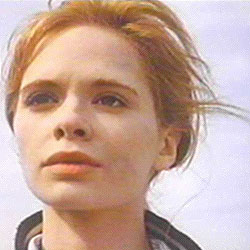Ellen and Jim Have a Blog, Too
We are two part-time academics. Ellen teaches in the English department and Jim in the IT program at George Mason University.


Adrienne Shelly's _Waitress_: fantasy pie-making · 14 May 07
Dear Marianne,
Yesterday was Mother’s Day, and (without knowing we did this), Yvette and I picked just the perfect movie for the occasion, one where the recitation of the basic central story misleads you about its mood and emphasis: Adrienne Shelly’s Waitress. We had no idea that a mother-daughter relationship would be the happy ending. The film manages to provide comic uplift out of the unresolvable tragedies, bad luck and choices of everyday life.
Mothers and daughters did seem everywhere: at Cinemart, the “art” film theatre (an independent) near us, there was only Georgia Rule (the other films we had seen). With an excellent cast (Jane Fonda, Felicity Huffman), directed by Garry Marshall, scripted by Mark Andrus, Georgia Rule is said to depict relationships between women in a family across the generations. We had liked Almodovar’s Volver which did just this. However, put off by the bad reviews, we decided on Waitress.
Not that we were particularly keen on Waitress. Leslie R had recommended it on WW, but the description of its central story as about a young woman, Jenna (Keri Russell) who works as waitress, is married to a mean, violent, controlling, perpetually bullying or cravenly demanding man, Earl (Jeremy Sisto), and then finds herself pregnant by him, Waitress seemed a movie guaranteed to make us suffer for its 107 minutes. Still the reviews kept saying it was very worth going to see; not to miss it. They were right. It’s not a grim film at all, but an amusing iconoclastic comedy whose real subversion is that the heroine, Jenna and her OB-Gyn doctor, the also married hero, Dr Pomatter (Nathan Fillion) indulge in a now frantically comic & now touching love affair while married to other people, and are not at all punished for this.
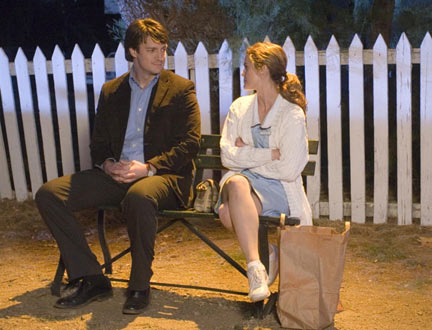
Nathan Fillion (Dr Pomatter) and Jenna (Keri Russell) waiting for the bus together
This casual adultery (if the scare word is wanted) is repeated in the affair of a parallel character, one of Jenna’s two fast friends, Becky (Cheryl Hines), with their boss, Cal (Lew Temple), the dinner manager. Becky’s life at home consists of caring for a decrepit crippled husband, and Cal’s of catering to a wife he’s bored by. Such romantic antics (the way the affair between Jenna and Dr Pomatter is depicted is sudden leaping into one another arms, frantic coupling while over-the-top romantic music emerges loudly from the screen) have a counterpart in the memories of the aging apparently obnoxious customer, Old Joe (Andy Griffiths!), who provides the advice to Jenna she needs (leave your terrible husband and make a “fresh start”) as well as the money (in the form of a fairy tale large check placed in a card on her bedside table the day he dies of an operation).
I tried to work out why the film was not just enjoyable, but fun. After all, Jenna does find herself pregnant by Earl and decides (without apparently considering abortion at all) to have the baby. Earl is an utter horror. He is a continual aggressive bully, demanding she listen to his every word, obey him in each gesture and word she emits while with him; he takes her salary from her, refuses to allow her the least freedom from him; threatens, insults, demands she say she loves him and (when he discovers she is pregnant) only refrains from demanding she have an abortion after she promises she will love him much more than the child. He makes frightening scenes in front of everyone where he seems about to beat her up within an inch of her life (and once does hit her hard in the face. This man is Bad Husband Material:
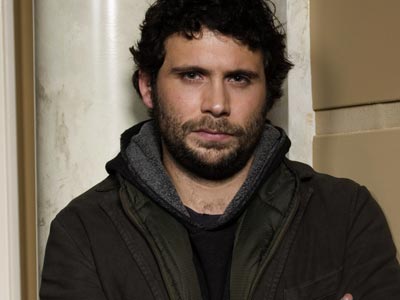
Jeremy Sisto as Earl
The only place he seems unable to make her his puppet is in the area of sex: we see her continually refusing him, and while he forces himself on her, it’s only just, and he is often put off as apparently sex is not enjoyable to him unless she is really responding physically and she can’t fake it, and this he does accept.
She says until the birth of the baby she does not want a child. She refuses to be congratulated; she has bad dreams about it bullying her and taking over whatever space she has left. It will be the intolerable burden which will prevent her from ever leaving Earl. (For she hates Earl though to his face she will say whatever he wants, including vowing an undying adoration for him.) In the ads this aspect of the movie—her ambivalence towards her pregnancy and the coming child—is presented as what is candid and refreshing about the film. We are given a sense of how much she suffers and works and the howling pain she feels when giving birth. It’s not beautiful. There is a problem though. A woman with such an attitude, would she not have an abortion, even if the clinic and doctor she usually goes to will not perform such procedures. And upon the birth of the child, she falls immediately in love with it and all ambivalence vanishes. So if an anti-abortion type went to see the movie (which such a person probably wouldn’t having read the plot summary), he or she could say the movie validates the choice not to have an abortion. See had she not had the child, the happy ending where she has the beautiful little girl growing up by her side, dressed in a matching golden dress (the final scene where we see mother and daughter walking down a road toward the sun allude to the The Wizard of Oz), would not have occurred.
Of course the pregnancy had to be brought to full term. If not, there would not have been a movie. It’s the pregnancy that apparently keeps her subject to Earl. Where is she going to run away to while she is so in need of doctors and care and rest too? And has no money.
Why this matter does not make the film a painful ordeal is it does not dominate the screen. The story is dominated by Jenna’s time on the job, her success at the dinner making exquisitely delicious pies (this is done in an over-the-top fairy tale manner which makes her into a magician of infinite types of pies), her good and warm friendship with Becky and Dawn (played by Adrienne Shelly, a fine comic actress).
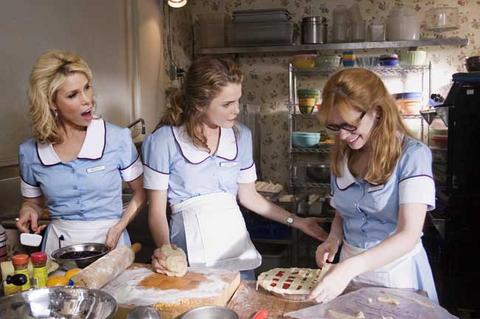
3 friends: Becky (Cheryl Hinds), Jenna (Keri Russell), Dawn (Adrienne Shelly)
So often women’s comic films have these trios of women friends at the center (Nicole Holofcener’s Friends with Money, Helen Fielding’s Bridget Jones’s Diary has them if not at the center); when the film is tragic, we still have a band of women at the center which crosses generations, only this time one or more betrays the others treacherously, terrifying and causes the death of at least one and cruel rape of another (e.g., Deepa Mehta’s Water).
We see the start of Dawn’s happily married life when Jenna puts make-up on Dawn after she has made a blind date with Ogie (Eddie Jemison) whose lack of cool and homeliness and unabashed sentimentality and vulnerability she is at first shocked, and turned off by, but who wins her over. Dawn marries at the dinner (one night it is closed for the ceremony and affair) and it is to her home Jenna retreats when after the birth of her baby, Lulu, she with ease (very improbably) leaves Earl at long last.
Jenna seems powerful and competent and in charge while at the dinner. There she strikes up a deep solacing and supportive relationship with Old Joe, the aging ill man everyone else regards as an obnoxious bully but who has of course a heart of gold and great intuition. Joe is the first to guess she’s pregnant; he surmizes she is having an affair; he validates how terrible her husband is; he urges her to leave him. And he ignores her complaints about the pregnancy.
Her affair with the sweet, tender, upper class doctor, Pomatter, who is all consideration and nervous stress, and clearly wouldn’t hurt a fly punctuates the ongoing story so-to-speak. We see her learn to confide in him and long phone conversations at night are suggested as the accompaniment to their snatched love-making during the day. One idyll shows her teaching him how to make a pie.
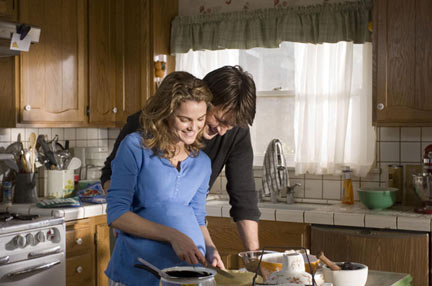
Nathan Fillion (Dr Pomatter) and Jenna (Keri Russell) cooking together
Yes the traditional image of woman as feeding men, as in effect food herself is kept up in this film. Because it’s a woman’s film does not mean it rejects the patterns of behavior women are educated into. Sometimes (paradoxically) people assume such a film (or equivalent book) would do that. Why so, hard to say, except maybe the anti-feminist impulses of media use this suspicion (deriving no doubt from ideas that many women don’t like the coerced cooking and other women’s duties) to keep women away from films which would critique how they are will they nill they spending their lives, what some of them take pride in. (Not me, at least not this. I don’t cook. While I like to eat, I don’t like it enough to be bothered to make elaborate dishes. I’d rather spend my time reading, studying, writing.) Part of the film’s pleasantness or ease comes from its acceptance of how women cook, worry about the size of their breasts, what they will be wearing, cosmetics (not that I do the latter either).
The pace, background music and many of the gestures and lines of the movie all reinforce or make for comedy. The colorful simple clothes, the archetypal roles we are presented with distance us from the action and remind us we are watching a movie.
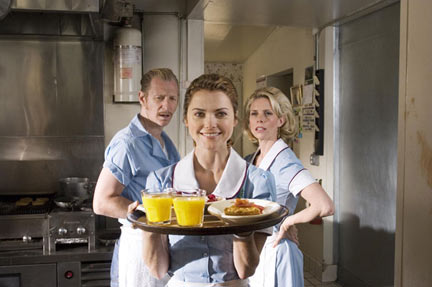
Jenna smiling (in love with Dr Pomatter), having interrupted Becky (Cheryl Hines) and Cal (Lew Temple), the managerial boss
madly kissing
All the while despite the shying away from what would be the actual solution of such a woman (abortion and then try to leave the husband, and probably be stalked and need the help of police), the audience is confronted with problems and issues real women face. If you make a bad choice in your marriage, how do you escape when the world gives him the big income, him the presumptive right to control the relationship, and expects you to justify leaving him, and remain sexually faithful? How as a woman do you make enough money to become comfortable. The film provides the fairy tale godfather (Joe with his check), and the magical pie-making which leads Jenna to a contest where she is pictured taking home another fat check as a prize. But we half-know it’s a fairy tale and the question is asked.
The diurnal, life as small things which project larger values and norms, is its basso continuo. This is womens’s films stuff (as well as women’s books). So says Alison Light in her great book, Forever England, about women authors in the 1930s through 40s, women then dismissed as simply pop and meretricious (as oppposed to the overly serious political Orwell, Graham Greene, and the like): Ivy Compton-Burnett, Jan Struthers (Mrs Miniver), Daphne DuMaurier, Dorothy Sayers. The audience was not all women, but it was mostly women. And they enjoyed it. They laughed and laughed and appeared made happy as they left the theatre.
I recommend this film, Marianne. If you miss it, you are missing a time which speaks to women (and men too) who have hearts and minds able to love unselfishly, understand humane joy and reject life-destroying self-alienating pieties. Although it’s final sceen is not so much a refuge, as overt wish-fulfillment that is dream fantasy, it is a post-feminist film, and I found one rave review which called it (fondly) a chick flick.
It is part of a tragedy too: Adrienne Shelley was murdered last November (the 7th, 2006).
Adrienne Shelly (1966-2007)
Elinor
--
Posted by: Ellen
* * *
Comment
- The context for this movie is described in an excellent article in Said It:
An excellent essay in Said It:
Contemporary Feminism in a Porn culture
http://saidit.org/archives/jun06/article5.html
Here’s an early central paragraph which contains Whisnant’s thesis:
“Now think about it: in this cultural and political context, a feminism that acquiesces to certain key male entitlements, while simultaneously presenting itself as bold and liberated and rebellious, is likely to be appealing to many women. A version of feminism that supports girls’ and women’s desired self-conception as independent and powerful, while actually requiring very little of them as far as confronting real male power, will similarly have wide appeal. It is my contention (now jumping ahead by a decade or so) that the versions of feminism currently most popular in the academy and in U.S. popular culture more broadly are of exactly this kindand that the backlash dynamics I just described are on especially clear display with respect to the politics of pornography. After all, in one important sense, what happened in the eighties was good news: back then, the feminist critique of pornography had enough cultural, political, and intellectual momentum that an orchestrated campaign was required to defeat it. For at least the past decade, however, despite the best efforts of many of us in this room, that critique has largely dropped off the radar screen, replaced in some quarters by a depoliticized faux-feminism that caters to rather than challenging the porn culture ...”
Ellen
— Elinor May 14, 7:20am #
commenting closed for this article

